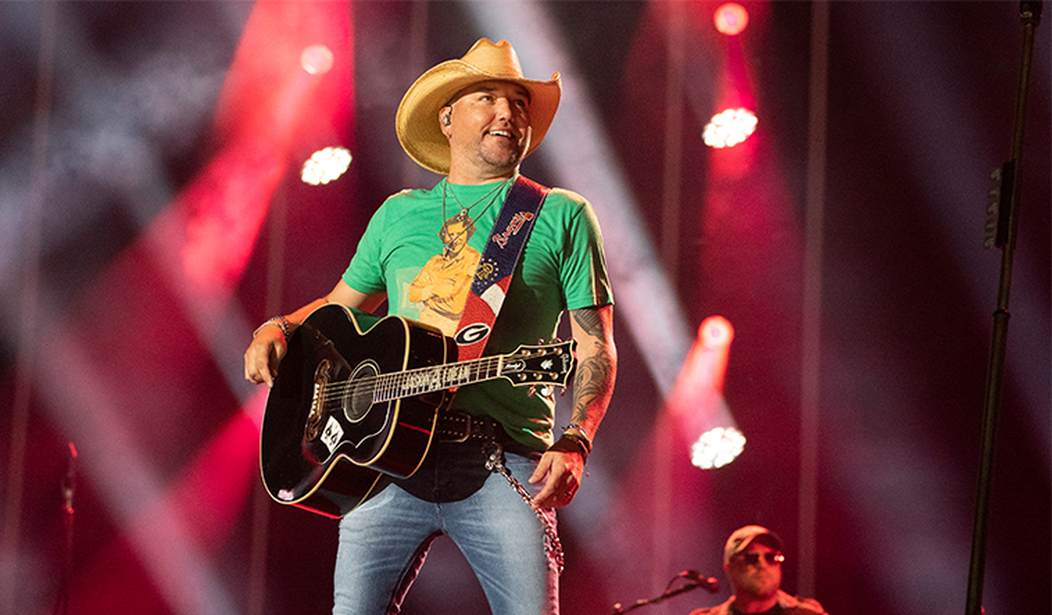Jason Aldean’s song “Try That in a Small Town” has generated a lot of controversy. Apparently, rioting in big cities is something to be celebrated and not condemned. Or perhaps the videos of the rioting following the George Floyd murder didn’t have enough white people in them.
Some on the left have referred to the song as “pro-lynching.” Since there are no lynchings in the video, pro or con, you have to twist yourself into a pretzel to follow the logic in that charge.
For those who haven’t watched it, here is the hugely entertaining video:
Like they used to say on “American Bandstand” when judging a new song: “It’s got a good beat and you can dance to it.”
Beyond that, the song appeals to the atavistic feelings we all have about America and small towns. It’s a feeling of patriotism plus a reverence for “home” — even if we grew up in the suburbs or a large city. It’s the sense that there are some things worth defending in America — with guns and violence if necessary.
Related: Weekend Parting Shot: Laughing the Woke Away
Writing in The Free Press, Coleman Hughes points out that Aldean’s lyrics are no more violent or objectionable than those of some rap musicians.
Compare that to lyrics by Grammy award-winning rapper 21 Savage: “I pull up with the stick [gun] and let this bitch spark. Swear I would’ve shot that cracker if I was Rosa Parks.” Or consider these lyrics by Grammy Award winner Lil Baby, perhaps the most popular rapper alive right now: “My homie got the stick, I got the glizzy / We don’t fear them / These niggas don’t wanna play with us / I swear that we gon’ kill them.”
Progressives have tolerated these kinds of lyrics in mainstream rap for decades. Indeed, it has been the left that has historically defended rap crews like N.W.A and 2 Live Crew when they came under accusations of promoting violence and obscenity. What disturbs progressives is not the fact that Aldean’s song contains macho, pro-gun lyrics—which are ubiquitous in rap. What disturbs them is the fact that Aldean is a straight, white, conservative male, and therefore must play by a different set of rules than black, left-leaning artists.
Tennessee state representative Justin Jones called it a “vile racist song” and a “lynching anthem.” The knee-jerk reaction of the left isn’t surprising. They called Charlie Daniels a “war mongerer” after his classic “In America” came out.
And after 9/11, Toby Keith’s raucous patriotic anthem “Courtesy Of The Red, White And Blue” generated enormous controversy. Keith was barred from performing at a patriotic song fest on ABC when he refused to soften the lyrics. At the time, the Dixie Chicks’ Natalie Maines created a stir when she said, “I hate it. It’s ignorant, and it makes country music sound ignorant. It targets an entire culture — and not just the bad people who did bad things. You’ve got to have some tact. Anybody can write, ‘We’ll put a boot in your a**.'”
Perhaps. But it also expressed the attitude of tens of millions of Americans at the time.
For those who might suggest that it’s the polarized country we live in today that’s responsible for Aldean’s travails, these other examples prove otherwise. There is a skein of denigration that runs through recent American history where small towns, rural America, and the values that live in the people who inhabit them are sneered at by the left and the negatives are grossly exaggerated.
There are many like me in this country. People who could not wait to put their small hometowns in the rearview mirror because they couldn’t or wouldn’t fall in line. People who dreaded the thought of going back to them on holidays because, at the moment your feet land on the ground where you were raised, the memories come flooding back. You dread the moment when you run into someone from high school who wants to talk about how great it was. But you have nothing to add to this conversation because you don’t remember the glory days in quite the same way.
Small towns aren’t perfect. And people who live there know it. But there is a sense of neighborliness and a feeling of patriotic devotion that you do not find in much of urban America.
All Aldean was trying to show was that where many people praised the anti-police demonstrations — even if they were “mostly peaceful” — small town people didn’t think it was possible to separate the violence from the demonstrations. They saw the reality unfold on their screens or phones and wondered how anyone could justify the violence.
Pro-lynching? If anything, the video is anti-violence and makes the strong statement that some things are worth defending.










Join the conversation as a VIP Member